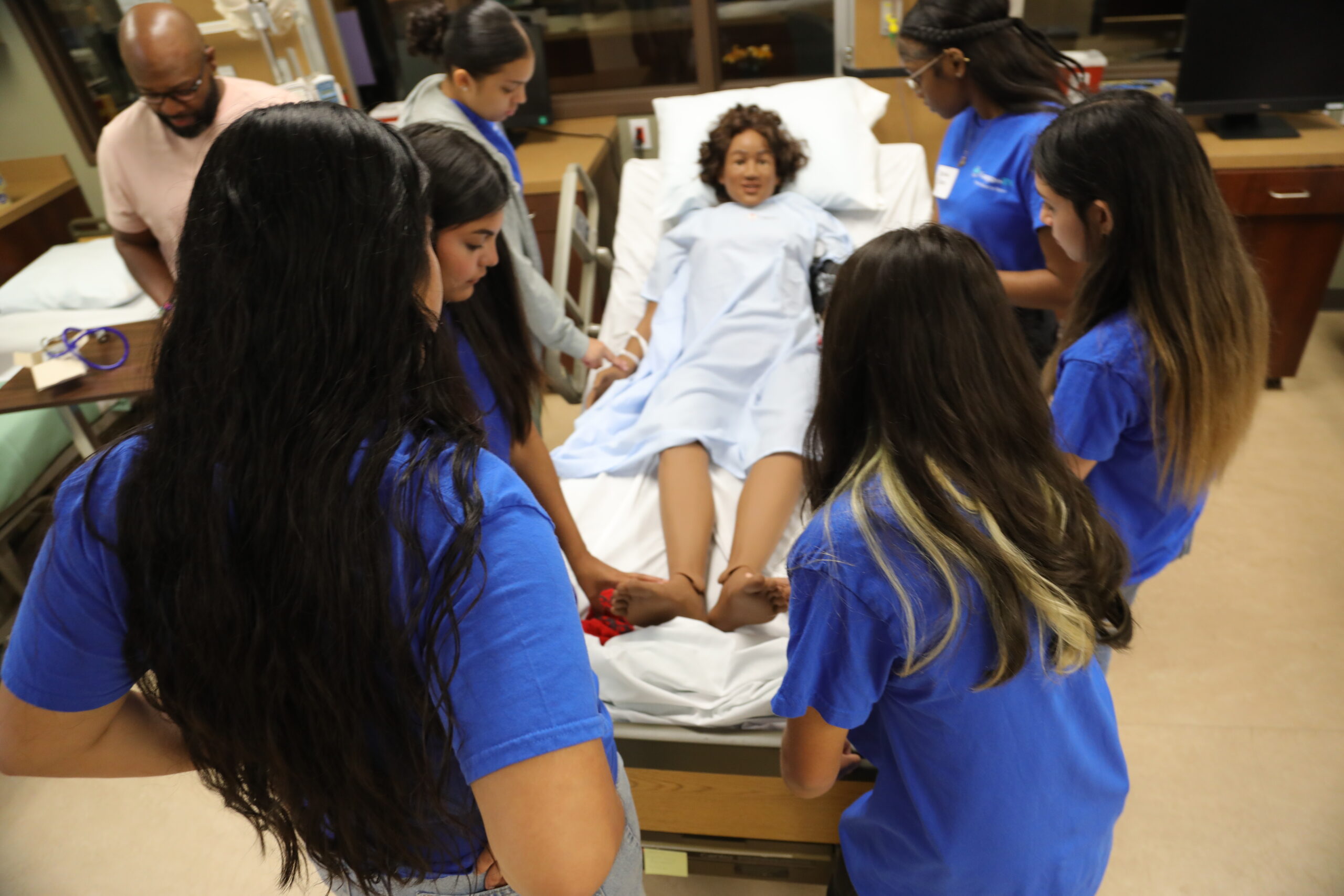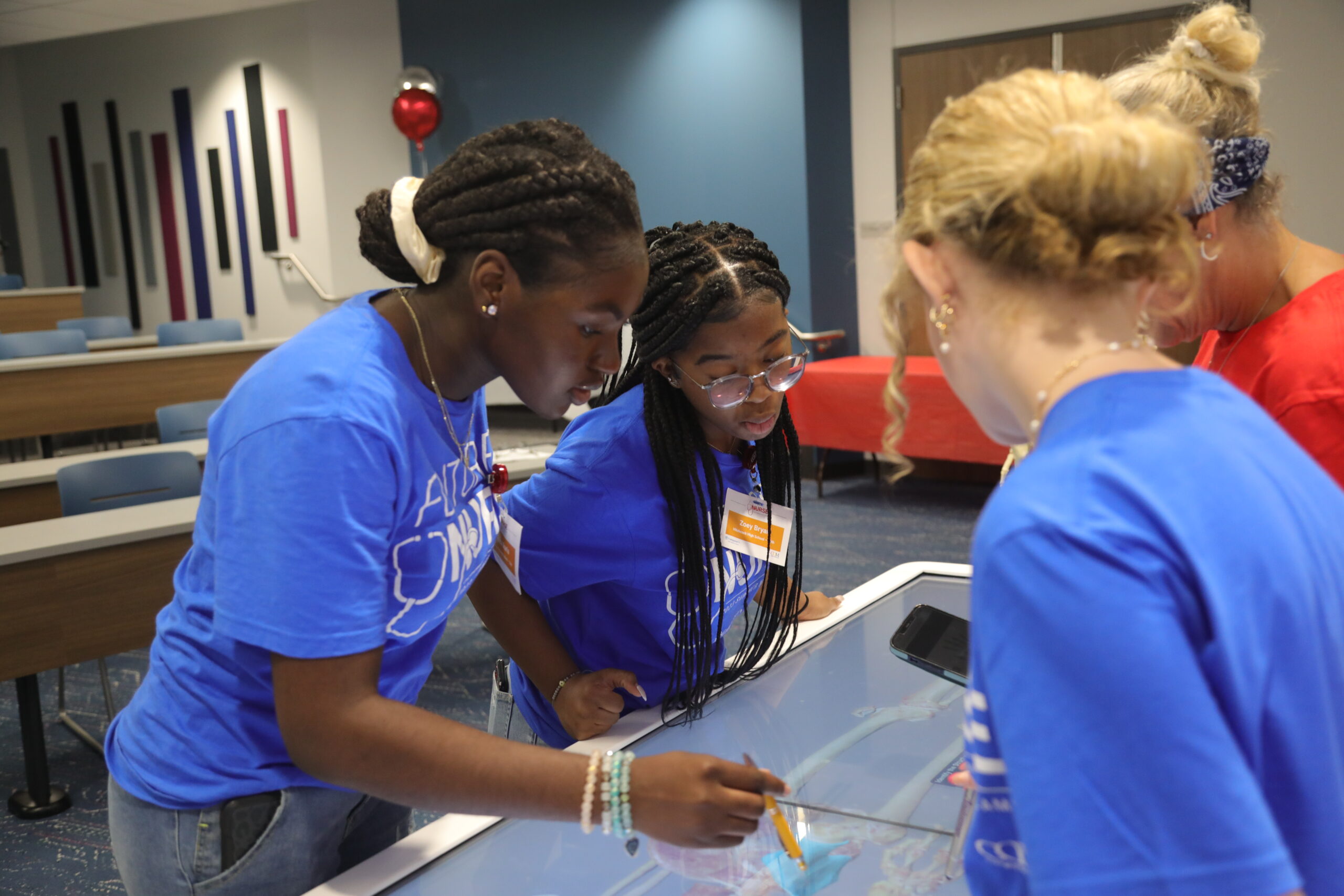
Finding your purpose and calling in life can be overwhelming, but it doesn’t have to be – when you start with tuning into what interests you, and then take baby steps to gain exposure to the profession and learn from others who are already there.
For Renée G. Omoyeni, the journey to her calling as a nurse began early on. “I've always wanted to be a nurse. I was attracted to what nurses do in the hospital and just helping people,” Omoyeni shares. “I never wavered from wanting to become a nurse.”
“I will never forget a patient I cared for who received a terminal diagnosis and transitioned to hospice all within the same week. I developed a bond with him and his daughter and was able to come back on my day off to say goodbye the day he passed at his request,” Omoyeni recalls. “He had a love for sports, so I sat with him as we watched his favorite team, and I vividly remember feeling the reassurance that I chose the right career path for myself. As a child, I loved watching ER and anything that featured nursing - I was always so fascinated by the thought of becoming a nurse.”
Thinking back to when she was first getting started in nursing, Omoyeni, who began her pre-nursing journey at Valencia Community College in 2002, wishes she had more exposure to opportunities in healthcare careers in high school and more support in figuring out HOW to take the right steps towards a career in nursing.
“As I started to navigate the journey into nursing, I wish I had more guidance and support early on. I didn’t know what classes in high school would best set me up for nursing, nor did I have the best grades. Having someone who could have given me more direction, focus and information on the different pathways into the profession would have been really helpful,” says Omoyeni.
“Since I was kind of clueless about how best to position myself to get into nursing schools, I received a lot of denials and a couple of waitlist notifications,” she shares. “In the meantime, I decided to become a License Practical Nurse (LPN), but I didn’t take my studies seriously, so I failed out a few months before graduation. I was super discouraged and wondered if my dream would ever happen. But I didn’t give up. I refocused my efforts, took my application to nursing school very seriously and I ended up getting into a BSN (Bachelor of Science in Nursing) program the following year.”
Completing her goal, Omoyeni graduated from Bethune Cookman University with a BSN degree in 2010.
“I look back on the eight years it took me to go through the entire process and in retrospect, I see so many areas I could have improved upon to avoid the delay, but I have zero regrets. I'm grateful for my journey because it taught me so many lessons on strength and resilience, and it allows me to relate to and encourage others on their own path - no matter how difficult and discouraging it may seem along the way,” Omoyeni adds.
Today, she is a practicing nurse in Houston, Texas and she also founded CompassRN, a nurse-led nonprofit organization connecting underserved and underrepresented middle and high school students to nursing career opportunities.
Opening the door to a career in healthcare
For students who are curious about a career in nursing, Omoyeni suggests starting by learning the basics.
In high school
Enroll in classes that relate to health sciences, like Biology to learn about living organisms, Anatomy & Physiology to learn about how the body systems work together, and even Algebra as math is a part of health science and nursing (think about needing to give the proper dose of medicine to a patient).

Get experience to see if nursing is for you
“Volunteering in the hospital is a great way to start being around other professionals and to see firsthand if health care is something you want to do,” Omoyeni shares.
If you’re interested in healthcare, but not yet ready to commit to nursing school – consider continuing your learning journey by becoming a CNA (Certified Nursing Assistant) or a Medical Assistant, which provides a great way to experience working directly with patients and gaining exposure to health care. CNA programs typically last between four to 12 weeks or require about 75-120 hours of training. CNA programs are typically offered at a variety of institutions and locations including community colleges, vocational and technical schools, nursing homes and long-term care facilities, online programs, The American Red Cross, high schools, hospitals and adult education centers. Medical Assistant programs can vary in length and content. They are often available as certificate or diploma programs, which can typically be completed in 9 months to a year, or as associate degree programs, which may take 2 years.
Some hospitals and medical facilities provide paid training programs for these roles, where students receive on-the-job training for their certification exam as well as an employment offer for full-time work following certification.
Another option is getting your LPN (licensed practical nurse) degree, which usually takes about 12 to 18 months and covers subjects like nursing fundamentals, pharmacology, and clinical skills. LPN programs are relatively shorter in duration compared to registered nursing (RN) programs, which means you can start working as a nurse sooner. You can typically find LPN programs by contacting local educational institutions, checking online, checking with your state's nursing board or regulatory agency, and contacting healthcare facilities about nursing opportunities. Make sure that any program you consider is accredited and meets the licensing requirements of your state. After you become an LPN, if you want to continue to build your education and expertise, you have the option of going back to school to become an RN.
RELATED: For Healthier Communities, We Need You in Nursing
Getting Started in Nursing
If you’ve decided that a career in nursing is the right path for you, one of your first steps will be weighing your individual needs and determining which pathway will help you achieve your desired nursing career. There are a variety of ways to become a nurse!
Omoyeni advises exploring the following options to see which one is a good fit:
Community college. Community colleges are cost-effective, and graduates can get an ADN (Associate Degree in Nursing) or ASN (Associate of Science in Nursing), and when you graduate, you are ready to take the NCLEX certification exam to become an RN. Courses taken at a community college can also typically be used to bridge students to a four-year college or university, where they would pursue a BSN (Bachelor of Science in Nursing).
“I'm a huge advocate for community colleges because you get the core classes like science, math, psychology, etc., that you would take at a 4-year university or college, but at a lower cost,” Omoyeni says. “If you're looking live at home or juggle working while going to school, community colleges can be a great start for you. Your class sizes aren’t as big as having four or 500 students at a big university.”
Four-year university or college. Students attending a four-year university can obtain a Bachelor of Science in Nursing (BSN).
“Both ADN and BSN nurses work side by side in the hospital and clinic setting, but the BSN degree includes a focus on leadership and management that can help transition a nurse's career into advanced practice roles (i.e., nurse practitioner, CRNA, etc.), education, administration, and other opportunities,” Omoyeni says.

In addition, Registered Nurses (RNs) with a Bachelor of Science in Nursing (BSN) degree tend to earn higher salaries than those with an Associate Degree in Nursing (ADN) or a diploma in nursing.
Depending on the schools you're considering and comparing, the difference in costs between four-year colleges and community colleges could be significant with four-year colleges and universities being traditionally more expensive.
Navigating finances
Whether you decide to go to community college or a four-year program, paying for school can be a big worry. Luckily, there are several options that may reduce the financial burden as you pursue your nursing degree:
Scholarships. Nursing scholarships play a vital role in making higher education accessible to individuals with a passion for healthcare, but who might not have financial means. They can also promote diversity and excellence in the nursing profession. Scholarships recognize the potential and dedication of aspiring nurses, allowing them to focus on their studies and training without the worry of overwhelming student debt. You can find scholarship opportunities through school financial aid offices, local and national associations, and through scholarship database websites like Johnson & Johnson, which allows you to search for nursing scholarships based on your profile and preferences, and professional nursing organizations.
Financial aid. From federal programs to scholarships and loan forgiveness options, financial aid can help you chart a more affordable path toward your nursing degree. You can typically find information on financial aid from various sources, including government agencies, educational institutions, and private organizations. Again, check out Johnson & Johnson’s nursing website for information on financial aid options.
Nursing Tuition Reimbursement. Hospitals have multiple ways to help you pay for nursing school including tuition reimbursement, work-study, nursing scholarships, and grants. Another great avenue is choosing a healthcare system that will pay or reimburse nursing school expenses in return for employment over an extended amount of time. This offers a great opportunity to gain first-hand experience working in a clinical setting while pursuing short-term or long-term career goals,” Omoyeni advises.
Additional pathways into nursing. For students looking for other pathways into nursing, the military is a great avenue.
“I have a friend who joined the army when she was 17 and she just retired at 37. The military offers programs where they pay for your training and education and you gain experience.,” Omoyeni adds. “For example, the army has an LPN (licensed practical nurse) program where you can work as a medic and then if you decide to get out of the military, you have your LPN certification. And even for military members who didn't go into the service knowing that they wanted to be a nurse, they might pay for you to go to college where you can explore and decide what you want to do. They even have a CRNA (Certified Registered Nurse Anesthetist) program. They offer so many different certifications that you can get that can set you up for a career after the military without having to pay for it.”
Renee’s own path to nursing included the military. After graduating from college and passing the NCLEX-RN (National Council Licensure Examination [for] Registered Nurses, Omoyeni joined the army. “I completed a nurse residency program and got great exposure to nursing specialties, which set me up for a nursing career outside of the army,” Omoyeni says adding that she spent almost four years in the Army.

Setting Yourself Up for Success/The importance of mentorship
Mentors can also play a crucial role in helping students considering becoming nurses and nursing students by offering guidance, support, and real-world insights, helping them navigate challenges, develop clinical skills, and build the confidence needed to excel in their nursing education and future careers. Mentorship can be important as nursing students graduate and transition into their first clinical roles as the transition can be tough and getting guidance and support from a mentor is invaluable.
Even if you are a student who is driven – someone who knows what they want to do – it's helpful and important to find someone to support and guide you along the way. There are so many things you will experience for the first time – it's always good to have a mentor to talk with.
“Outside of school resources like health science pathways and HOSA – Future Health Professionals, I'd recommend looking into volunteer opportunities at your local hospitals and clinics. Gaining access to the medical field is a great way to surround yourself with nurses and other healthcare professionals who can provide inspiration and motivation,” Omoyeni suggests.
Nursing School Resources
As a nursing student, utilizing the resources at your fingertips, such as textbooks, online materials, faculty guidance, and clinical experiences, empowers you to maximize your learning, enhance your skills, and prepare for a successful and impactful nursing profession.
Omoyeni offers advice for students embarking on a journey into nursing:
- Find nurses who share your interests. Engaging with nurses in your community is not only an excellent way to gain knowledge and insights about healthcare but also an opportunity to build connections, access support, and contribute to improving healthcare practices and services locally. “Social media is a great tool to connect with nurses in your area,” Omoyeni says.
- Explore, explore, explore. It’s never too early to start searching for information about nursing online (nursing.jnj.com is a great resource), consider subscribing to a nursing magazine, etc.
- Find the right balance. “You want to have fun in college, you want to hang out. You can still do that, but make sure that you have this mindset of this is what my intentions are. In addition, you have to prioritize – you might not be able to go out on a Friday because you have to study for a test, but after you pass the test you can go out and have fun,” Omoyeni advises.
A career in nursing can be demanding, but if you prepare early, embrace the education and experiences that lie ahead, stay committed to learning, stay compassionate, and stay resilient, you will thrive.
To learn more about a career in nursing, go to nursing.jnj.com.
Sponsored by Johnson & Johnson








